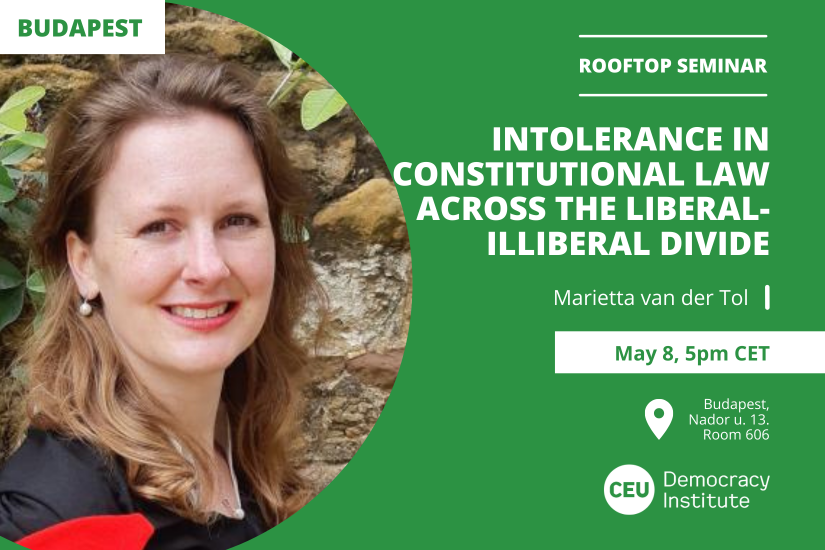
The De- and Re-Democratization Workgroup of the CEU Democracy Institute cordially invites you to its next Rooftop Seminar.
If you would like to attend, please register here.
Please keep in mind that external guests will not be able to enter the building without prior registration.
What does it mean to tolerate diversity in a post-Christian and post-secular state? In many European states, political conflicts over diversity express themselves in constitutional repertoires, such as the dynamic interpretation of constitutional concepts, constitutional amendments, and legislation that restricts fundamental freedoms. This seminar addresses the urgent need in comparative constitutional law to understand the use of constitutional repertoires for intolerant purposes, and to analyze it across the liberal-illiberal divide. It articulates a concern over the rise of constitutional intolerance: the instrumentalization of constitutional repertoire for intolerant purposes by (majoritarian) democracies in Europe. It presents four iterations of constitutional intolerance, hailing from France, the Netherlands, Hungary and Poland: (1) France’s leveraging of the broad concept of laïcité (i.e. strict separation of church and state) and reliance on the living together doctrine, such as in the criminalization of the full face-veil; (2) The liberties that the Dutch legislature has taken in the substantiation of public order, inscribing unspecified social norms into a principle that aims at objective concerns of security and good order, such as to criminalize the full face-veil; (3) Hungary’s discrimination against religious organizations that are critical of the Orbán-government; and (4) The constitutionalization of hetero-normative marriage in Hungary and Poland as an expression of their constitutional identity. The guiding argument is that intolerance is not only a potential undercurrent of illiberalism or indeed of liberalism, but also relies on the vulnerability of constitutional structures to political expressions of intolerance.
The paper is available at request from the author.
Speaker:
Marietta van der Tol is a Post-doctoral Fellow at the Blavatnik School of Government at University of Oxford. She leads the international networking collaboration ‘Religion, ethnicity and politics in German, Dutch and Anglo-American contexts: nationalism and the future of democracy’, as well as the Cambridge-based project ‘Protestant political thought: religion, state, nation’. Her research interests include the relationship between religion, politics and society, and the role that political imaginaries play in the formation of law and public policy with regard to religious minorities in Europe. She studied at Utrecht University (LLM Hons in law, MA in history) and then won a Fulbright grant to study at Yale University (MAR Hons in history of Christianity). In 2016, she started her PhD in politics and international studies at Sidney Sussex, Cambridge as a Vice-Chancellor’s and AHRC DTP scholar.
Discussant:
Renata Uitz is Co-Director of the CEU Democracy Institute and Professor of Comparative Constitutional Law at the CEU Department of Legal Studies. Her major research interests lie in transition to and from democracy, the protection of individual autonomy and religious liberty. Her current work focuses on illiberal constitutional practices and the normalization of illiberal constitutionalism. Her book publications include Routledge Handbook of Illiberalism (co-edited with András Sajó and Stephen Holmes (Routledge 2021)) and The Constitution of Freedom: An Introduction to Legal Constitutionalism (OUP 2017).
Chair:
Andreas Schedler is a Senior Research Fellow at the CEU Democracy Institute. He is the Lead Researcher of the De- and Re-Democratization Workgroup and a Visiting Professor at CEU Vienna. Before joining the CEU, he was a professor of political science at the Center for Economic Teaching and Research (cide) in Mexico City. A leading comparative scholar of democracy, democratization, and authoritarianism, he has conducted research on democratic consolidation and transition, authoritarian elections, anti-political-establishment parties, political accountability, and organized violence.